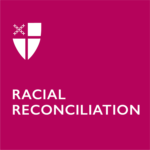Hoping for Belonging as a Palestinian Priest

By Leyla King
My grandmother was four months pregnant with the child who would become my mother in April 1948 when, along with my grandfather, she fled for her life from her home in Haifa, Palestine, to Beirut, Lebanon, on a cargo ship. The two nights and one day on the ship, seasick and hormone-nauseated, with no food or water, no notion of what life was available to them in Beirut, were one of the darkest experiences of my grandmother’s life. It was an experience shared by many others like her in those horrifying days of the spring of 1948 as Israel was founded and more than 750,000 Palestinians were forcibly evicted from their homes by violence, terrorism, and explicit existential threats.
But as awful as those hours on the boat were for my grandmother, they were also the genesis for her strong faith—and my own. My mother’s family has been Anglican for so many generations back that we do not know when we joined the church. Before they were forced to flee, my grandparents were staunch members of St. John’s Church in Haifa, where they had met in the choir and where they were married on Jan. 3, 1948. But while my grandmother had always been a believer, it was on the cargo ship to Beirut, wracked with fear and nausea, that she reached the depth of despair and, turning to God, found his presence there with her. “Oh, God,” she prayed, “Get me through this moment.” And she knew her prayer was heard.
And there I was, half a person, the first cells of an egg within my own mother’s forming fetus tucked inside my grandmother’s womb. I know, without a doubt, that I carry my grandmother’s trauma in that awful moment in my own body today—and I carry her faith that emerged from it, too.
 The Rev. Leyla King (center), on the day of her diaconal ordination, stands with her grandmother, Bahi (right) and mother, May (left). Photo courtesy of the Rev. Leyla King.
The Rev. Leyla King (center), on the day of her diaconal ordination, stands with her grandmother, Bahi (right) and mother, May (left). Photo courtesy of the Rev. Leyla King.
That faith, her legacy to me, is the main reason why I am an ordained priest in our church today. It is also the source of yet another level of grief. It has always been hard for me to be a Palestinian Episcopalian. Again and again, in more ways than I have space to articulate here, my church has failed me. The Episcopal Church has failed to see me and my people, to name and claim us—in all our Palestinian-ness—as equal members of our communion, to hear our voice and tell our story. And I grieve that.
Yes, it has always been hard to be a Palestinian Episcopalian—but it got so much harder after Oct. 7, when, in its haste to condemn (rightfully) Hamas’ violence and to care for our Jewish siblings, The Episcopal Church avoided and ignored the plight of my people, the history of our suffering, and the reality of our current persecution. Only in the final days of Holy Week, nearly half a year after the Israeli bombardment of Gaza began, did The Episcopal Church sign on to a strongly worded statement against the genocide of Palestinians in Gaza. It was too long, and it is still not enough.
And yet, here I am, still very much clinging to my belonging in this church that I love, in the same church that my ancestors chose hundreds of years ago. My hope and prayer are that one day, the church will see me and love me, a Palestinian Episcopalian, back.
What does that look like? What would it mean for The Episcopal Church to see and love the Palestinians in our midst? It would mean that statements about the Holy Land made by our bishops and prominent leaders point to and lift a wide range of voices of Palestinian Anglicans and Episcopalians—not just the archbishop of Jerusalem. It would mean that our churches and congregations study the wealth of resources about the Palestinian Christian experience that is already out there. (Check out PACA’s resource page for a start!) It would mean ensuring that Palestinians—as well as other Arabs and Middle Easterners, like Armenians and Persians—are counted among the many minority groups that The Episcopal Church recognizes as traditionally unseen and worthy of our advocacy. It would mean paying attention to our pain and seeking out ways, together, to bring God’s healing and wholeness, God’s reconciliation and redemption to it.
On the cargo ship on her way to Beirut, my grandmother prayed to a God whom she trusted, to be present to her, and to support her through her sorrow and suffering. And God did. Today, I pray for the same for my people, and I hope and trust that the church will take an active part in God’s answering of my prayer.
The Rev. Leyla King is a Palestinian-American Episcopal priest and writer, an advocate of small churches, and a wife and mother. She is a founding member of both Palestinian Anglicans and Clergy Allies (www.palestiniananglicans.org) and the Small Churches Big Impact Collective (smallchurchesbigimpact.org). She serves as the canon for mission in small congregations for the Episcopal Diocese of West Texas.
The post Hoping for Belonging as a Palestinian Priest appeared first on The Episcopal Church.